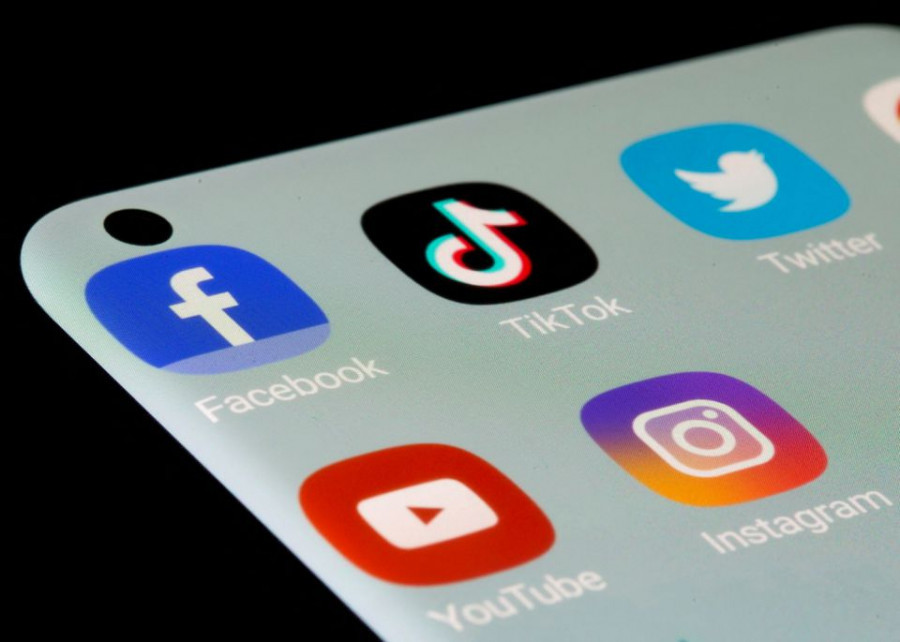Politics
Election Commission joins hands with social media giants to rein in misinformation
Officials working with Facebook, Twitter and TikTok on fake news, monitoring ad spending.
Anup Ojha
In a bid to control misinformation, disinformation and hate speech on social media during the upcoming elections, the Election Commission has announced plans to coordinate with tech companies like Meta (which operates Facebook and Instagram), Twitter, and Chinese firm ByteDance, the owner of TikTok, a popular video-sharing application.
“We are taking a new approach to tackle the spread of misleading information during elections,” said Dinesh Kumar Thapaliya, the chief election commissioner.
Thapaliya said the commission has already reached agreements with Facebook, Twitter and Whatsapp for the purpose. “We are having meetings with TikTok officials this week. If we come across any hate speech or disinformation against any candidate or political party, we will flag them and the companies will delete such content immediately,” said Thapaliya.
He said a trio of TikTok representatives from Singapore had visited the EC office a month ago.
In the recent past, during the American presidential elections of 2016 and the Brexit vote in 2020, social media was flooded with disinformation, misinformation and hate speech and allegedly affected the outcomes. In Nepal also, over the past few years, misleading news and videos have been rife on social media. Experts say misleading social media content can influence voter decision.
“It is a good initiative but the commission should have initiated broad public discussions before deciding to crack down on election-related misinformation,” said Santosh Sigdel, a lawyer and chairperson of Digital Rights Nepal, a non-profit that works for the protection and promotion of digital rights.
Google, Facebook, and Twitter had vowed to fight fake news, hate speech and abuse in their own ways during the 2016 US presidential elections.
“Meta is really concerned about the circulation of fake news during election times globally, and has committed to work with us,” said Thapaliya. He said the commission had also collaborated with Facebook and Twitter during the May local elections.
“But this time we are working in a more coordinated manner as we still have over a month to go for the elections. We also have to set up our own press office manned by experts,” added Thapaliya.
Almost all political parties are currently struggling to manage internal disputes over ticket distributions and to forge alliances, even with parties holding opposing views, triggering intense debates in public spheres and on social media. In such a situation, the likelihood of parties and individuals spreading fake and misleading information on social media to buttress their political agenda is high, say experts.
“We saw the negative impact of social media during the May local elections, so the commission’s initiative to tackle misinformation is praiseworthy,” said Bijay Limbu, a cybersecurity expert who is also the chief executive officer at Vairav Technology. “But its effectiveness will depend on what kind of software the commission uses for the purpose.”
Limbu added that if the commission uses good software, it can flag and remove almost 80 percent fake news on social media.
Election Commissioner Thapaliya said their initiative against misinformation will help many people who rely solely on social media feeds for news and information.
“Social media is so powerful today that it can shape and influence public opinion, so it is necessary to monitor what kind of information is being disseminated, especially during elections,” said Kamal Bhattarai, deputy spokesperson at Election Commission.
This time the commission will, through Facebook Ad library, also monitor political advertisements on social media and the expenses involved.
Anyone can access election-related advertisement data from the Ad library, and get such information on political ads like who funded them, approximate costs, and their reach across multiple demographics. The advertisements are stored in the library for seven years.
Although the commission has issued a strict code of conduct, observers say the election body does not have an effective mechanism to monitor its implementation.
The commission’s Election Code of Conduct 2079 (2022) bars publishing, broadcasting or disseminating baseless information in favour of or against any candidate in the media including social media.
Bhattarai said Meta has already trained EC officials and the US tech company is also organising training for Nepali journalists on misinformation, disinformation and hate speech in the coming weeks.
Kiran Chapagain, a researcher on crossborder disinformation who is advising the commission on behalf of the Nepal Policy Institute, said this is the first time a public institution in Nepal is working to curb misinformation, disinformation and hate speech.
“There is no specific law on these issues in Nepal, and we are very vulnerable in the ICT [Information and Communication Technology] field. The commission’s collaboration with tech companies is a signature initiative for social media policy reform in Nepal,” said Chapagain.
Meanwhile, Thapaliya said the commission had also worked with Facebook and Twitter during the last local elections to tackle election-related misinformation and disinformation, but it was less coordinated than now.
According to him, some people had spread fake news that the May local elections in Dolakha district had been cancelled, and the news was removed soon after the commission wrote to Meta.
“We immediately had the post removed through Meta and published a notice,” said Thapaliya. He said that at a time when the government does not have an effective social media policy, the EC’s initiatives can help formulate related legislation.




 8.79°C Kathmandu
8.79°C Kathmandu.jpg)














